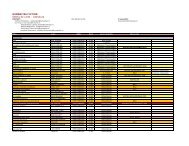- Page 3 and 4:
Vintilă Mihăilescu Bogdan Iancu M
- Page 5 and 6:
CUPRINS 00. Introducere / 9 Prof. d
- Page 7:
15. Non lieu et non dit: des héros
- Page 10 and 11:
mijloacele de transport la sacrific
- Page 12 and 13:
către alte spaţii cu speranţa re
- Page 14 and 15:
fost reconstruite, fiind afectate v
- Page 16 and 17:
că cele trei dimensiuni ale strati
- Page 18 and 19:
Români în Italia Italia a apărut
- Page 20 and 21:
Tabelul 1. Percepţii privind cores
- Page 22 and 23:
Poziţia ocupată în Italia ne va
- Page 24 and 25:
Educaţia şi bunăstarea copiilor.
- Page 26 and 27:
ine plătită (CURS, 2005) 19 . Ele
- Page 28 and 29:
facultăţi, să revină la activit
- Page 30 and 31:
în urma interacţiunii cu diverse
- Page 32 and 33:
poate implica revenirea în ţară
- Page 34 and 35:
Ocupaţie „împărţită în dou
- Page 36 and 37:
această situaţie. Vom reveni asup
- Page 38 and 39:
în decizia de migraţie, cât şi
- Page 40 and 41:
ecomandată de tatăl său. Agenţi
- Page 42 and 43:
sunt majoritari. Şi spuneau ceva d
- Page 44 and 45:
migratoriu a însemnat, în cazul l
- Page 46 and 47:
epuizant. Îmi vorbeşte cu recuno
- Page 48 and 49:
trăiesc din momentul ăsta, deci m
- Page 50 and 51:
jos descrie una dintre discuţiile
- Page 52 and 53:
espectiv schimbarea statusului soci
- Page 54 and 55:
Frăţia şi Comunităţii Catolice
- Page 57 and 58:
02. RAPORTURI SIMBOLICE ÎN MIJLOAC
- Page 59 and 60:
trebuie acceptat. Ce se întâmplă
- Page 61 and 62:
se decât în cazul oraşelor ameri
- Page 63 and 64:
Scopul a fost, mai degrabă, genera
- Page 65 and 66:
Resorturile sociale specifice tramv
- Page 67 and 68:
normativitatea care „emană“ de
- Page 69 and 70:
întârzieri. Ipoteza pe care o ava
- Page 71 and 72:
Ceasul de la metrou a facilitat inv
- Page 73 and 74:
exemplu, care caută de fiecare dat
- Page 75 and 76:
03. ŢĂRANI DE DUMINICĂ. CONSTRUI
- Page 77 and 78:
Aş putea spune că toate aceste tr
- Page 79 and 80:
ealizarea unei construiri a relaţi
- Page 81 and 82:
şi telefoane mobile în special -
- Page 83 and 84:
convorbire obişnuită persoana est
- Page 85 and 86:
toată lumea ştie unde locuia al F
- Page 87 and 88:
04. OMUL CARE OMOARĂ PORCUL. REPRE
- Page 89 and 90:
situaţii normale, familia se reîn
- Page 91 and 92:
din Feiurdeni un statut ontologic
- Page 93 and 94:
Tăierea porcului presupune două m
- Page 95 and 96:
şi deci imposibilitatea de a tăia
- Page 97 and 98:
Tehnicile tranşării Termenul gene
- Page 99 and 100:
şi ai crăpat şira spinării în
- Page 101 and 102:
05. COMERCIALIZAREA MORŢII: FIRMEL
- Page 103 and 104:
vieţii în direcţia morţii şi a
- Page 105 and 106:
mai mare în urma tranzacţiilor cu
- Page 107 and 108:
„imaginarul colectiv“ 85 . Indi
- Page 109:
Rotariu, Traian, Demografia şi soc
- Page 112 and 113:
cunoaşterii culturale prin însuş
- Page 114 and 115:
le să implice mai mult decât simp
- Page 116 and 117:
din peisajul comercial urban, dar
- Page 118 and 119:
pentru a-şi vinde produsele 97 . P
- Page 120 and 121:
în sine parte din patrimoniul loca
- Page 122 and 123:
de anunţ pe internet face referire
- Page 124 and 125:
şi culturale şi valorile la care
- Page 126 and 127:
a obiectelor care devin oglinda sch
- Page 128 and 129:
sau pivniţa ocupă un loc importan
- Page 130 and 131:
Imagine 11. Exemplu depozitare În
- Page 132 and 133:
în „matricea primordială“ a p
- Page 134 and 135:
Bibliografie Amilien, V., „Produi
- Page 136 and 137:
not even in the context of the anth
- Page 138 and 139:
acknowledged claims of German super
- Page 140 and 141:
First, I propose an approach that t
- Page 142 and 143:
that make research practically and
- Page 145 and 146:
08. CORPURI ŞI VIOLENŢĂ. NEVOIA
- Page 147 and 148:
considerată violenţă, cu toate c
- Page 149 and 150:
enumerate ar fi dificil de obţinut
- Page 151 and 152:
funcţii 138 , ceea ce îl va ajuta
- Page 153 and 154:
nu va pune presiune pe artere, ci p
- Page 155 and 156:
nu cedează până în ultimul mome
- Page 157 and 158:
ecunoscut în acelaşi timp şi că
- Page 159 and 160:
nici proteja de o lovitură dacă n
- Page 161 and 162:
inimă. Taurii pot prezenta o carac
- Page 163:
Jefferson, Tony, „Muscle, Hard Me
- Page 166 and 167:
practicat în acest spaţiu şi imp
- Page 168 and 169:
se păstrează mai ales în Budeşt
- Page 170 and 171:
început imediat după revoluţie.
- Page 172 and 173:
fie prin alte localităţi, în ind
- Page 174 and 175:
dintre aceştia“. Termenul de „
- Page 176 and 177:
mulţi turişti sunt dependenţi de
- Page 178 and 179:
Modalităţile de comunicare alese
- Page 180 and 181:
and refugees arrived after year 200
- Page 182 and 183:
needed. Due to the rough conditions
- Page 184 and 185:
the part of the state to facilitate
- Page 186 and 187:
in Romania his refugee status was w
- Page 188 and 189:
The year 2004 has brought along imp
- Page 190 and 191:
ight to stay in Romania. Moreover,
- Page 192 and 193:
for some time even after receiving
- Page 194 and 195:
housing. Until the integration prog
- Page 196 and 197:
average 250 USD per month, the equi
- Page 198 and 199:
were overlapped by the personnel’
- Page 200 and 201:
the Romanian citizenship. In the fi
- Page 202 and 203:
activities and information campaign
- Page 204 and 205:
Insufficient coherence between the
- Page 206 and 207:
in Romania enjoy“ half-way favora
- Page 208 and 209:
tema identităţii şi a etnicită
- Page 210 and 211:
fi femeie sau bărbat contribuie co
- Page 212 and 213:
datorate neînţelegerilor dintre n
- Page 214 and 215:
totul 8 galbeni. Da Averescu a chel
- Page 216 and 217:
astea“, dar şi practicată - fus
- Page 218 and 219:
din setul de elemente care erotizea
- Page 220 and 221:
căsătorii să fie încheiate la v
- Page 222 and 223:
culturală a unei minorităţi. Aş
- Page 224 and 225:
masculină de sorginte patriarhală
- Page 227 and 228:
12. BUNĂTATE PENTRU POPOR: SUBIECT
- Page 229 and 230:
articulaţia puterii între structu
- Page 231 and 232:
când interesul companiei ar putea
- Page 233 and 234:
Simţul comun şi încorporarea Ape
- Page 235 and 236:
sau este o „reacţie de însănă
- Page 237 and 238:
ale indivizilor prin ceea ce el num
- Page 239 and 240:
O altă concluzie se desprinde din
- Page 241 and 242:
13. CEREMONIALUL - DIRECŢII ACTUAL
- Page 243 and 244:
meşte dimensiunea simbolică în c
- Page 245 and 246:
e vorbeşte, la rândul său, despr
- Page 247 and 248:
compun un întreg, ceea ce ne aprop
- Page 249 and 250:
ţiilor, despre care afirmă că es
- Page 251 and 252:
transformativ. „Ritualul este tra
- Page 253 and 254:
de fapt, un mijloc prin care realit
- Page 255 and 256:
ceremonialului aulic va fi în prim
- Page 257 and 258:
decret de ordine interioară care s
- Page 259 and 260:
să facem parte din aceeaşi societ
- Page 261 and 262:
fapt ce face ca ritualul să reprez
- Page 263 and 264:
gie, „devianţa stimulează schim
- Page 265 and 266:
aceasta“ 270 . Dar schema ritului
- Page 267 and 268:
liderul ceremonial al grupului, ci
- Page 269 and 270:
„reprezintă tot un rit de trecer
- Page 271 and 272: - Dependenţa libertăţii individu
- Page 273 and 274: concurat la repoziţionarea stratur
- Page 275 and 276: chestionându-şi subiecţii asupra
- Page 277 and 278: Alegerea unuia dintre grupurile de
- Page 279 and 280: De menţionat şi că în cursul zi
- Page 281 and 282: la nunta lui Seok Gyeong-Jae, unul
- Page 283 and 284: Concluzii De o vârstă venerabilă
- Page 285 and 286: le exercită. Astfel, presa promove
- Page 287: Vasile, Marian, „Stratificare soc
- Page 290 and 291: vie des héritiers du gospodar par
- Page 292 and 293: mais aussi par une forme de distinc
- Page 294 and 295: pas une condition suffisante à l
- Page 296 and 297: elationnelle. Les conditions matér
- Page 298 and 299: souhaiter le maintien d’un travai
- Page 301 and 302: 15. NON LIEU ET NON DIT: DES HÉROS
- Page 303 and 304: On signale également la présence,
- Page 305 and 306: placée en bordure de ce lieu insol
- Page 307 and 308: d’ossements qui se seraient trouv
- Page 309 and 310: Ce questionnement se fera, avec, en
- Page 311 and 312: C’est là, sans doute, un aspect
- Page 313 and 314: „d’origine roumaine“ 356 .
- Page 315 and 316: „Les villages qui ont une populat
- Page 317 and 318: groupe de croix commémoratives se
- Page 319 and 320: Detienne, Marcel, L’identité nat
- Page 321: 16. SEEDS OF AN ENVIRONMENTAL MOVEM
- Page 325 and 326: decentered ethnography as a better
- Page 327 and 328: more closed with their information,
- Page 329 and 330: other hand, the young people tend t
- Page 331 and 332: cided to conduct Ecoweek sessions i
- Page 333: Snajdr, Edward, Nature protests: Th
- Page 336 and 337: povestesc despre sursa şi motivaţ
- Page 338 and 339: de DIY se extinde înspre alte zone
- Page 340 and 341: de spaţiu privat cu valenţe artis
- Page 342 and 343: mă voi referi în special la Home
- Page 344 and 345: eprezentaţiile ulterioare, obiecte
- Page 346 and 347: Când intru într-unul dintre locur
- Page 348 and 349: utilitară nu reduce cu nimic valoa
- Page 350 and 351: accentuează aşteptările şi obli
- Page 352 and 353: Următorul tabel oferă o mai bună
- Page 354 and 355: pentru „distracţie“. Nu exist
- Page 356 and 357: lucrare ne-ar da peste cap concepţ
- Page 358 and 359: Turner, Victor, „Rituals and Comm
- Page 360 and 361: provoace un răspuns puternic, chia
- Page 362 and 363: şi informatice (telefoane mobile
- Page 364 and 365: în 1968. De aceea studenţii din F
- Page 366 and 367: manifestaţiile-maraton de peste ş
- Page 368 and 369: În noul context european, oportuni
- Page 370 and 371: oboseală, de sensibilitate şi fra
- Page 372 and 373:
(ori de câte ori este posibil) pot
- Page 374 and 375:
în medicină din 1943. Dat fiind c
- Page 376 and 377:
Robbins, 1994). Studiile ulterioare
- Page 378 and 379:
o are observaţia lui Bichat, citat
- Page 380 and 381:
Rezultate Se pot identifica mai mul
- Page 382 and 383:
Î: Unii suferă rău, sunt loviţi
- Page 384 and 385:
E. D.: Doctoriţa mi-a spus să iau
- Page 386 and 387:
culese prin interviuri cu pacienţi
- Page 388 and 389:
Bibliografie Bichat, X., Recherches
















